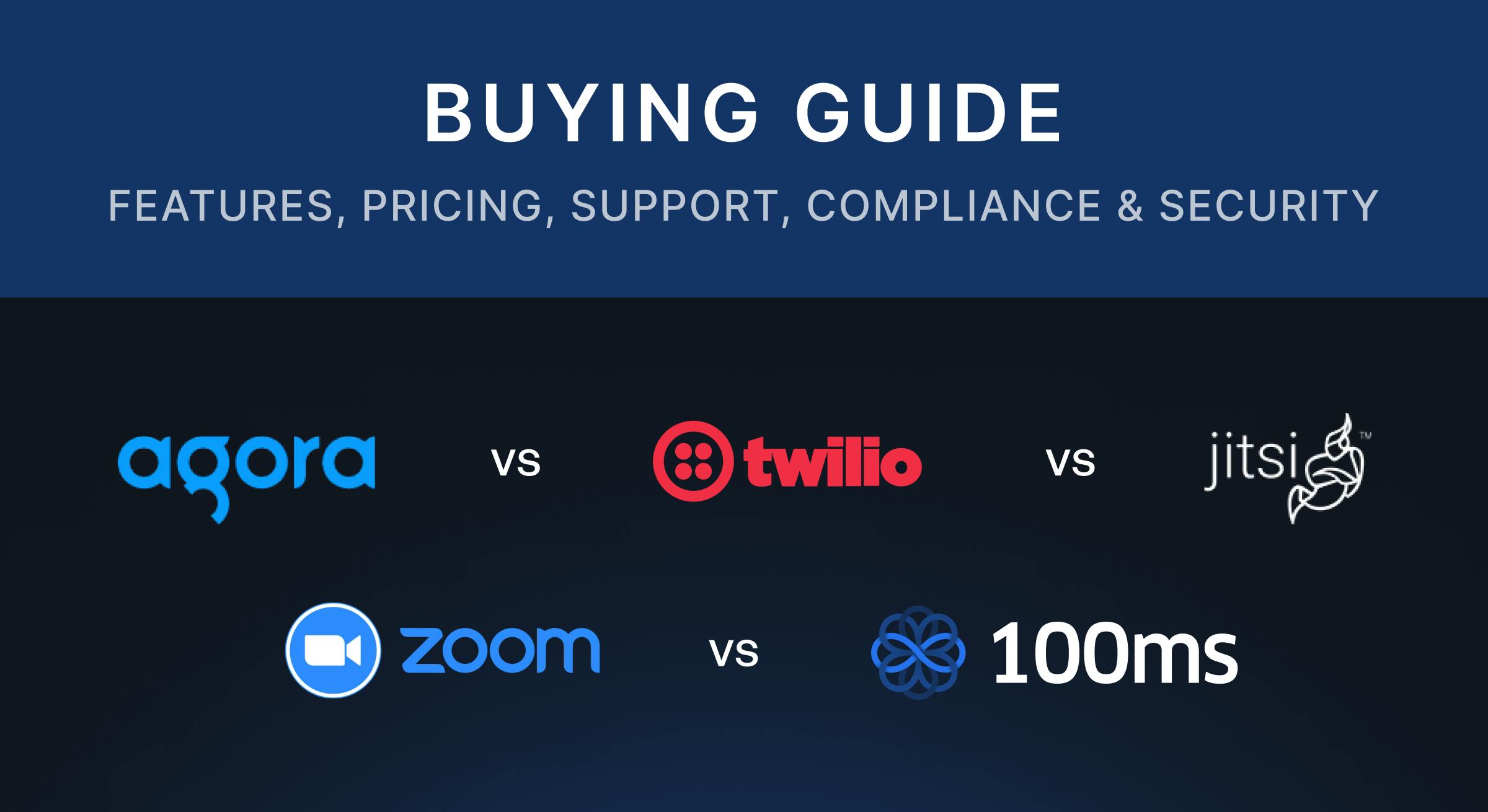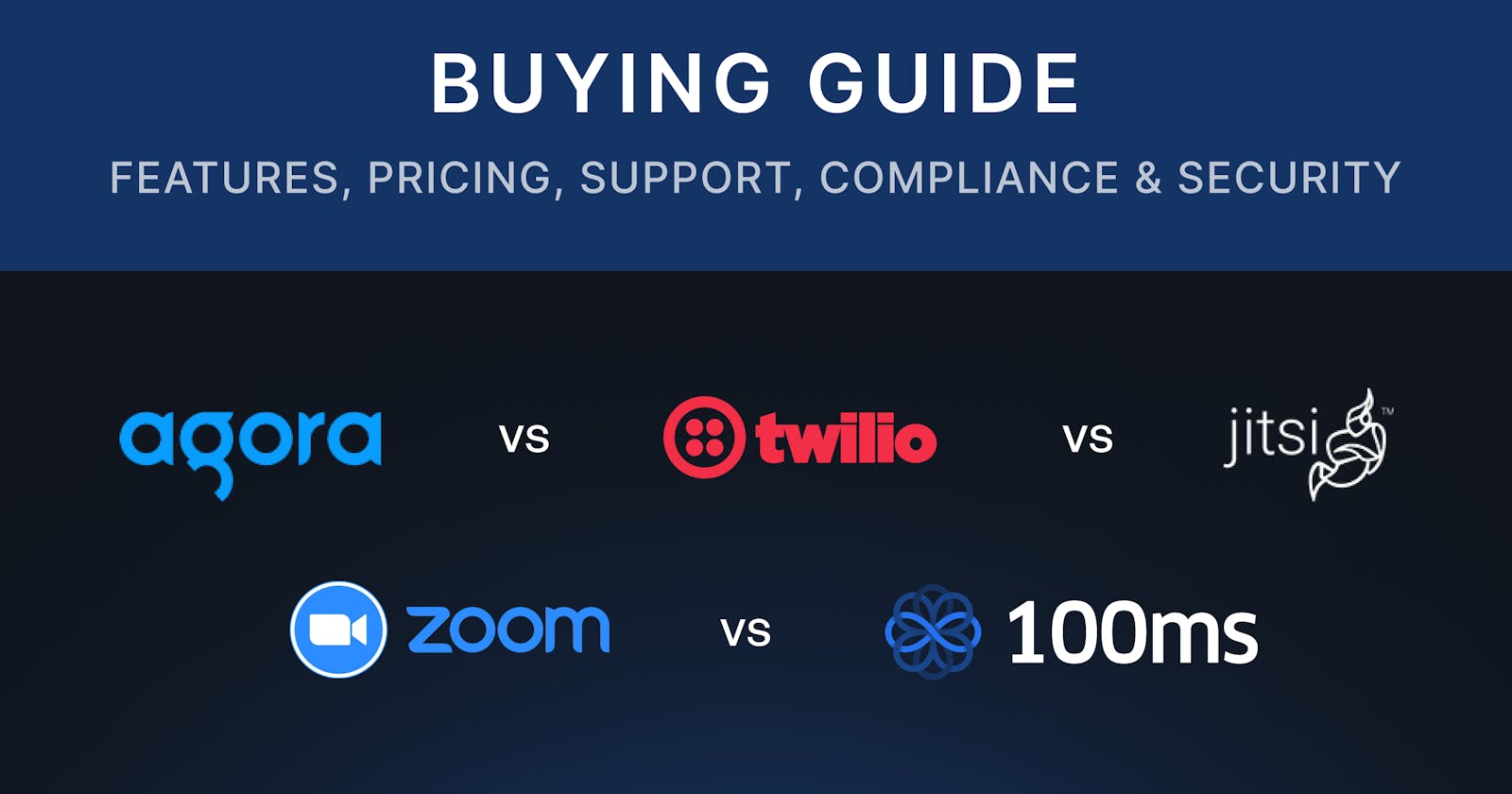
Video conferencing has been around forever. But what used to be the sporadic coast-to-coast team catch-up, or the predominantly inside sales call became a household necessity with the 2020 Covid-19 Pandemic. Everyday work. Family reunions. Even doctor consults, workout trainers, and online astrologers. Oh, and never forget the kids jumping in the background, drowning in the virtual class they were supposed to attend.
That said, smart businesses have been quick to offer video-enabled communication services since, and the trend just seems to be getting started, whether it's telehealth, test-prep, dating, or shopping. While businesses can obviously look at building this audio-video infra in-house, most find it time and resource-intensive.
Of course, building a scalable video infrastructure from scratch is no mean feat, unless that's the primary focus you want for your engineering team. Luckily there are at least a handful of Video SDK providers that offer best-in-class video infrastructure.
But then, how do you decide which one works best for you?
To answer that, we decided to put together this Buying Guide.
First, we've handpicked the best of the best video SDKs based on customer reviews, product usage, and the capabilities offered. And then, we battled them out on features & functionality, compliance & security, support, and pricing.
From features, time to respond, implementation help, and total cost of ownership, you should find all the details you need to make an informed buying decision right here.
The Buying Guide comprises four separate articles. Each article focuses on comparing vendors across a single, relevant parameter. All information for said comparison has been obtained from each vendor's publicly available documentation.
Here is a quick summary of each article. Click on the article link for a deep dive.
Functionality and Features
Each audio-video SDK offers specific features and functions that enable its customers to meet their goals. We've listed out the basic offerings across Agora, Twilio, Jitsi (Jitsi as a Service), Zoom, and 100ms below. However, you can go deeper and explore how vendors provide specific features such as streaming out with RTMP and HLS, active speaker detection, chat, polls, whiteboard, hand raise, and more in our detailed article.
Full article: Features & Functionality for for Agora, Twilio, Jitsi (JaaS), Zoom & 100ms
Agora
Users can build the video-calling feature using the SDK, while interactive live streaming can be built using Agora's Live Streaming SDK. Call recording can be enabled using the dashboard and API. Additionally, a noise reduction feature can be built using an additional integration. Agora also has a virtual background extension that allows for background modification. Background blur can be implemented using the SDK.
Twilio
With Twilio, users can build the video-calling feature using the SDK, while interactive live streaming can be built with Twilio Live. As for noise reduction, it can be built using the SDK. Call recording can be enabled using the dashboard and API. Background modifications can be built using the Twilio video processor SDK.
Jitsi (Jitsi as a Service)
Jitsi users can build video-calling, noise reduction, call recording, and background modification using the SDK. With regard to interactive live streaming, there is no explicit mention of it in the JaaS documentation.
Zoom
With Zoom, we have examined the feature offerings of both the Zoom Video SDK as well as the Meeting SDK.
Zoom Video SDK Users can build video-calling, noise reduction, and background modification features using the SDK. Call recording can be enabled using the dashboard and API. There is no explicit mention of interactive live streams in the Zoom documentation.
Zoom Meeting SDK Users can build video-calling, noise reduction, and background modification features using the SDK. Call recording can be enabled using the dashboard and API. For interactive live streaming, Zoom allows for the streaming of sessions with up to 10k participants.
100ms
100ms enables users to build video-calling, interactive live-streaming (HLS + WebRTC in a single SDK), background modification and much more using the SDK. Noise reduction is currently available in Beta. 100ms also allows for instant streaming of video conferencing sessions with up to 10k participants.
With data thefts and security breaches becoming more common with each passing day, it's important for decision-makers to understand the security features each audio-video SDK offers. To help with that, we've listed the compliance certifications that each audio-video infra provider holds, below.
However, for more details about security features such as access control, enterprise authentication, end-to-end encryption, privacy and encryption of recordings, and audit trails, please take a look at our detailed article.
Compliance and Security
With data thefts and security breaches becoming more common with each passing day, it's important for decision-makers to understand the security features each audio-video SDK offers. To help with that, we've listed the compliance certifications that each audio-video infra provider holds, below.
However, for more details about security features such as access control, enterprise authentication, end-to-end encryption, privacy and encryption of recordings, and audit trails, please take a look at our detailed article.
Full article: Compliance & Security for Agora, Twilio, Jitsi (JaaS), Zoom & 100ms
Agora
- GDPR
- HIPAA
- CCPA
- COPPA
- ISO/IEC 27001
- SOC 2
Twilio
- GDPR
- ISO 27001
- AICPA SOC 2
- HIPAA
Jitsi (Jitsi as a Service)
- HIPAA
- GDPR compliant for data processors
Zoom
- SOC 2 Type II
- GDPR
- HIPAA
- ISO/IEC 27001:2013
100ms
- SOC2 Type 1 & SOC 2 Type 2
Support
Vendor support is as important a factor as the features they provide. Integration and post-integration support extended by these providers will help you when something breaks on the backend, and you need expert support.
While you can find a short summary explaining the support extended by Agora, Twilio, Jitsi, Zoom, and 100ms below, we've also created an elaborate comparison to give you a full overview in terms of Cost of Support, Integration/Account Management Support, Post-Integration Support, and Community Support.
Full article: Support for Agora, Twilio, Jitsi (JaaS), Zoom & 100ms
Agora
Agora has different paid support plans - Standard, Premium, and Enterprise. Apart from these, the platform offers one free support plan.
Twilio
Twilio has four different support plans - Developer (free), Production (paid), Business (paid), and Personalized (paid). As for the plans, support is based on the volume of usage.
Jitsi (Jitsi as a Service)
Jitsi's open-source version is supported by a large community - the Jitsi community forum. Apart from this, Jitsi's paid version, 8x8 Jitsi as a Service, includes dedicated support for strategic customers, as explained in their Global Premium Plus Support plan.
Zoom
Zoom offers dedicated support for developers via Premier Developer Support which offers prioritized developer-specific resources. This guide does not explore Zoom support plans aimed at non-dev users and admins.
100ms
All support functions are available to paying customers at no additional cost. 100ms also offers testing support at no extra cost. This includes user testing, load testing, and network/device stress-testing.
Pricing
Pricing is one of the most crucial deciding factors when it comes to purchasing an SDK. As with the other parameters, here's a quick overview of what each vendor charges.
However, details on each vendor's pricing policies are beyond the scope of this piece. We've put together a detailed guide that explains the pricing models, pricing for recording, live streaming, add-ons, and more for each of these providers.
Full Article: Pricing for Agora, Twilio, Jitsi (JaaS), Zoom & 100ms
Agora
Agora's pricing is based on usage, which includes the number of minutes used, the number of users, and the unit price. However, Agora follows pricing on the basis of aggregate resolution in calls - this has been explained in detail in the main article.
The unit price per 1,000 minutes is $0.99 (for audio) and $3.99 (for video HD). Pricing for Video Full HD, Video 2K, and Video 2K+ is explained in detail within the main article.
Twilio
Pricing for Twilio scales with participant minutes. We have examined the pricing of two Twilio video products - Twilio P2P & Twilio Video Groups.
Twilio P2P Allows up to 3 participants and up to 10 audio-only participants. Priced at $0.0015 per participant per minute.
Twilio Video Groups Allows users to create video apps for up to 50 participants. Priced at $0.004 per participant minute - defined only by the minutes a user spends connected in a room.
Jitsi (Jitsi as a Service)
Jitsi's pricing is based on a per-user model and charges for monthly active users (MAU). According to Jitsi, an MAU is a user who attends at least one meeting with at least one other user within a particular month. An MAU is also tracked on the basis of the device they log in from.
JaaS offers various plans, and the pricing for each plan varies depending on the MAU. The JaaS Dev plan allows up to 25 MAU free, and only add-ons are charged extra. Under the JaaS Basic plan, pricing is $99 per month for 300 MAUs. The pricing for JaaS Standard, JaaS Business, and plans with more than 3000 MAU are mentioned in the main article.
Zoom
Zoom offers two SDKs: a Video SDK(charged on the basis of usage) and a Meeting SDK (charged on per user basis).
Zoom Meeting SDK The Meeting SDK offers four paid tiers: Basic, Pro, Business, and Enterprise. To use the Meeting SDK, the host is the only person who must purchase and hold a license. This license carries a specific limit on the number of participants who can be supported in each tier.
Zoom Video SDK Under Zoom Video SDK, there are two pricing levels. With pay-as-you-go, you get 10,000 minutes per month, after which the plan is priced at $0.0035 per minute. At the second level, you pay $1000 per year with 30,000 minutes included per month. After the limit is crossed, you pay $0.003 per minute.
100ms
100ms offers a single SDK offering both video conferencing and live streaming capabilities with straightforward pricing for both use cases.
100ms offers 10,000 free minutes for conferencing and another 10,000 free minutes for streaming for each business every month in addition to 1000 free encoding minutes.
Beyond this, video conferencing is charged at $0.004 per participant per minute, while audio-only calls are charged at $0.001 per participant per minute. Live Streaming costs $0.004 per broadcaster and $0.0012 per viewer per minute, while additional encoding minutes are charged at $0.04.
While there are various parameters and aspects that PMs, CTOs, and decision-makers need to keep in mind, these are a few that we considered indispensable. We recommend that you have a look at the separate pieces focusing on each of these parameters. They offer research-based data from each vendor, as well as helpful links you can use to conduct in-depth research yourself.
To know more about how 100ms can help fill in your video conferencing requirements, book a call with us.
